Rachel Reeves
is set to confront a new crisis today as
Donald Trump
launches a new wave of devastating tariffs.
Tonight, the U.S. President is set to unveil comprehensive tariffs on products sourced globally, potentially undermining the Chancellor’s most recent fiscal strategies just seven days post their announcement.
Markets around the globe have plunged in anticipation of Mr Trump’s so-called Liberation Day, and yesterday Britain’s economy suffered a string of downgrades.
White House
Aides have apparently prepared proposals for substantial tariffs around 20 percent on approximately $2.3 trillion worth of goods imported into the U.S. each year.
British authorities fervently attempted to broker an economic agreement with the U.S. to safeguard local enterprises, yet they have abandoned all expectation of finalizing such a deal prior to the imposition of new tariffs.
Sir
Keir Starmer
Even extended an invitation to Mr. Trump to visit the UK in June for signing a deal aimed at avoiding tariffs, but the U.S. President declined.
Economists propose that the tariffs might eliminate the financial cushion that Ms. Reeves established for herself in her Spring Statement last week.
Professor David Miles, from the Office for
Budget
The Office for Budget Responsibility (OBR) informed members of the Treasury Committee that they estimated if tariffs of 20% or 25% were imposed on the UK and sustained over half a decade, “it would eliminate all the buffer that the government presently possesses.”
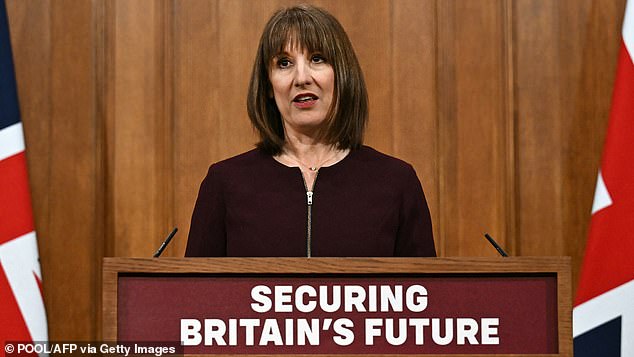
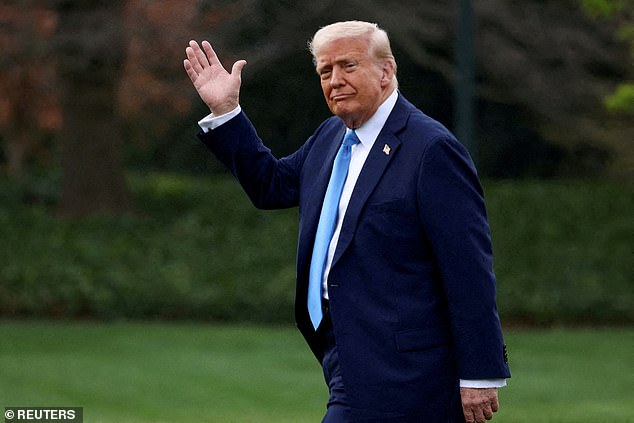

Yesterday evening, a think tank alerted that over 25,000 automotive manufacturing jobs in the UK might be threatened due to potential American import duties.
The Institute for Public Policy Research warned that they could “entirely disrupt the UK car manufacturing sector,” noting that workers at Jaguar Land Rover and Mini faced significant risks.
The Conservatives claimed that Labour has suffered from an ‘enormous blunder’ regarding trade policies, and as a result, the British economy will face consequences.
Andrew Griffith, the party’s spokesperson on economic affairs, informed Sky News: “Regrettably, Rachel Reeves will need to return the following week for an additional emergency budget as the measures she presented last week did not survive even a single week.”
“She did not account for US tariffs, and the small margin she had will be completely wiped out by the effect of these tariffs on our economy.” Last night, specific aspects of Mr. Trump’s plan were still vague before his scheduled address at the White House Rose Garden later this evening.
However, his press secretary Karoline Leavitt maintained an assertive stance, stating that the ‘historic’ tariffs signify ‘the era of America being taken advantage of has ended.’
“He is currently working alongside his trade and tariff team to refine it, ensuring that this will be an ideal agreement for both the American people and workers,” she stated yesterday.
Bloomberg Economics determined that in the most adverse situation, up to 1.3 percent of the UK’s gross domestic product (GDP) could be jeopardized.
This could erase what little economic growth Britain has seen this year and create a significant gap in the precarious government budget.
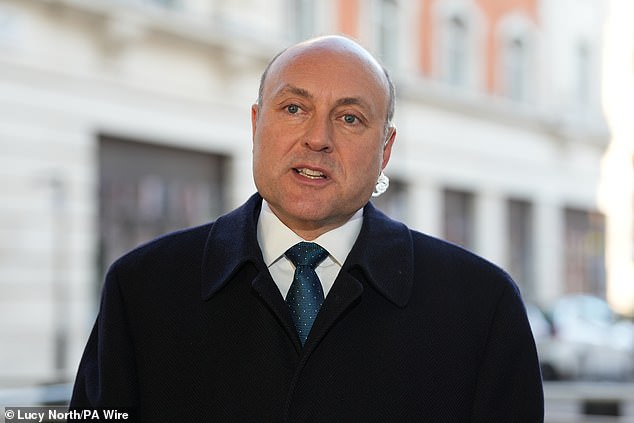
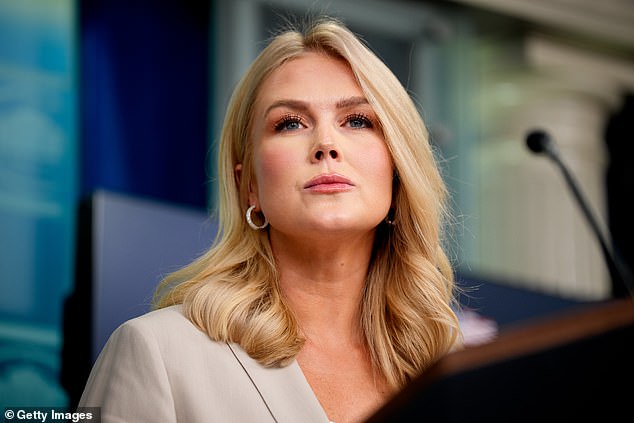
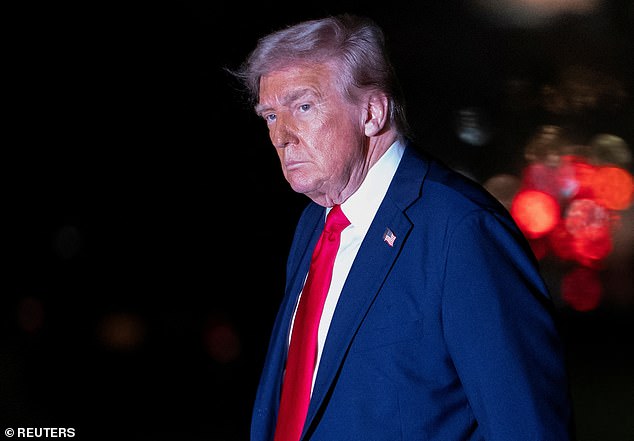
According to the Bloomberg prediction, if the U.S. increased tariffs on British imports by 35 percentage points, it could lead to an 80 percent reduction in trade. In a less severe situation where tariffs were raised by 25 percentage points, the UK would still experience a 70 percent decline in exports to the United States, which equates to a 1.1 percent decrease in GDP, as determined by Bloomberg’s analysis.
US investment giant Goldman Sachs also downgraded its UK growth outlook for this year to 0.8 per cent.
In November, Goldman forecasted a 1.6 percent economic expansion for the UK this year. However, they have since lowered their projections due to the clarity of Mr. Trump’s policies and now estimate that the trade conflict could reduce growth by almost 0.5 percent.
This encompasses the effect of earlier imposed tariffs on steel and aluminum, along with those on automobiles, in addition to a projected 10 percent duty on products deemed ‘essential’ for major sectors.
Nevertheless, this presupposes that the UK avoids what are known as “reciprocal” tariffs set to be unveiled today — similar to those imposed by the U.S. on trade partners that enforce value-added tax (VAT).
If Britain encounters these tariffs, the consequences might be even more severe.
Last week, the OBR reduced its forecast for UK economic growth from 2 percent to 1 percent; however, this projection does not consider the impact of the trade war, which will likely cause additional harm to the economy.
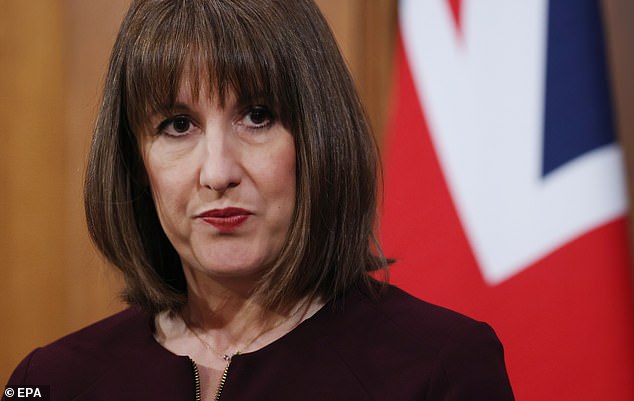
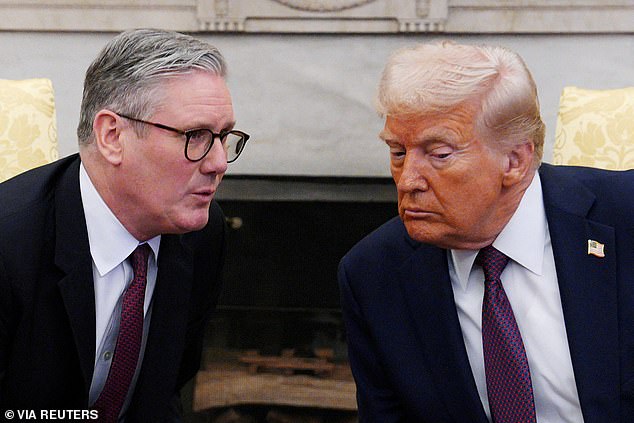
Ms Reeves provided herself with £9.9 billion of buffer space in relation to her fiscal guidelines during her Spring Statement. She might have to raise taxes or enforce additional budget reductions if this cushion is significantly reduced.
It seems improbable that the UK will react with prompt counter-measures, contrasting with other entities targeted by Mr. Trump’s sanctions like the European Union.
The Prime Minister stated that enterprises desire a ‘measured and composed reaction to this situation, rather than an impulsive one.’ However, he emphasized that ‘every option remains available.’
Sir Keir additionally mentioned that negotiations regarding an economic agreement typically span ‘months or even years.’ However, he noted that ‘within just a few weeks, we have made significant progress in these discussions.’ According to sources from Whitehall, a pact might be concluded shortly following the imposition of tariffs.
Mr. Trump introduced this measure by signing an executive order designed to combat ‘ exploitative ticket scalping,’ with a focus on restructuring pricing for live entertainment events. Accompanying him in the Oval Office was 54-year-old musician Kid Rock, who was dressed patriotically.
Read more

